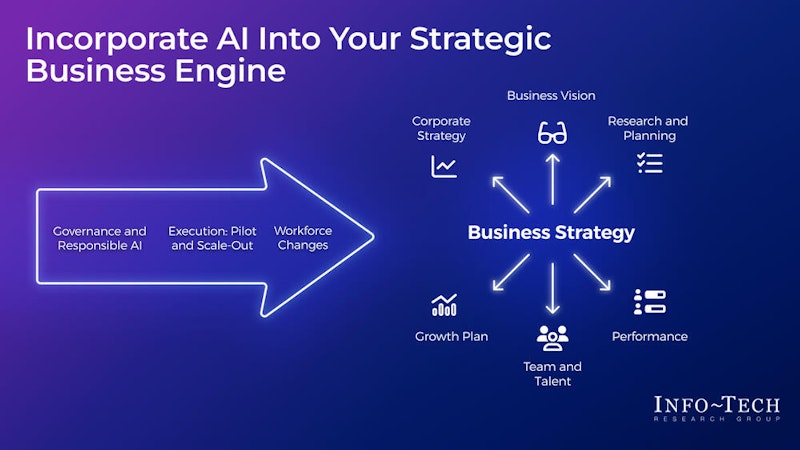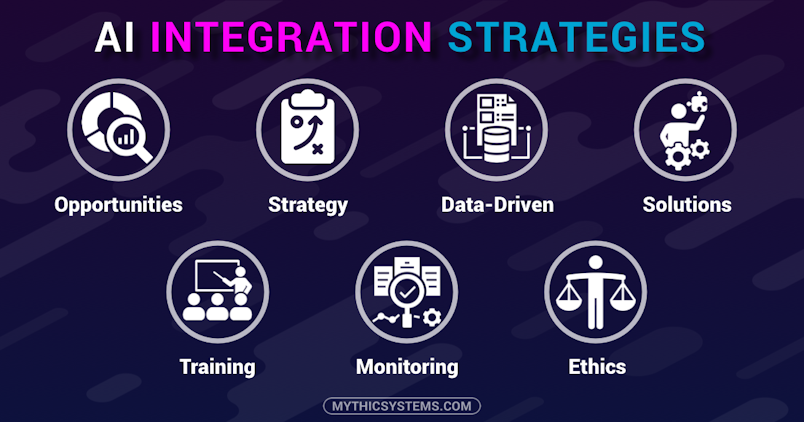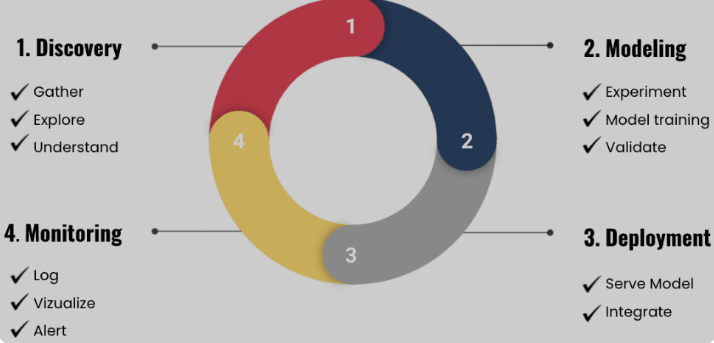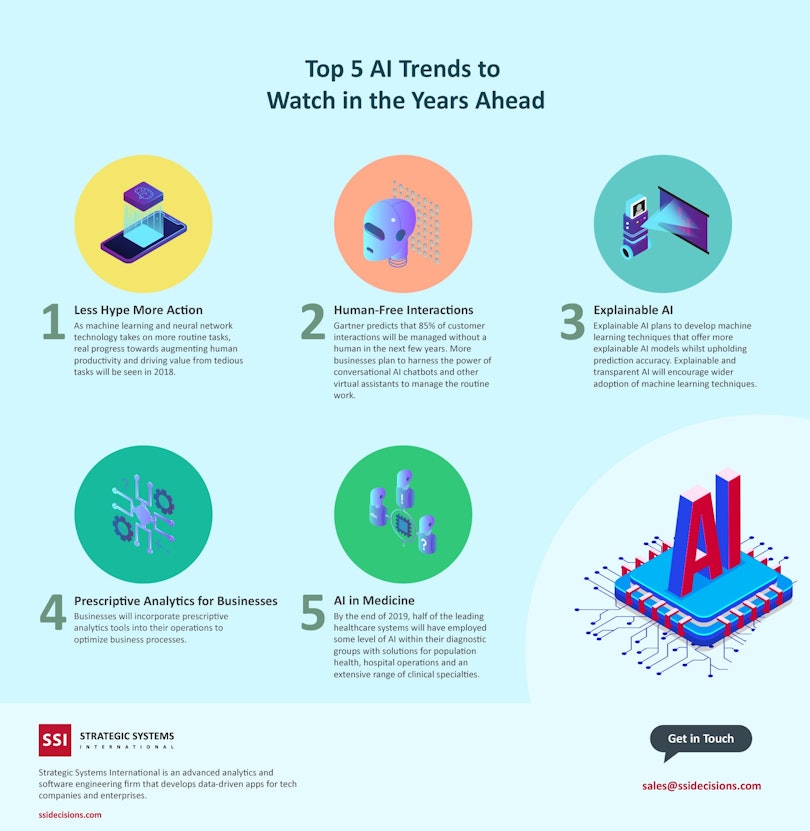Can your business afford to ignore the power of Artificial Intelligence (AI)?
Imagine a world where decision-making is no longer just human intuition but a sophisticated blend of data-driven insights and nuanced understandings of customer needs. This is not a scene from a futuristic novel but the reality of today's business landscape, where AI stands as a beacon of innovation and efficiency.
Picture this: a small startup uses AI to analyze market trends, predict customer behavior, and tailor services that seem almost psychic in their accuracy. Meanwhile, a century-old corporation automates processes that once took weeks, now completed in mere hours, thanks to intelligent algorithms. These stories are not anomalies but testaments to a new era of business—a world where AI is not just an add-on but the backbone of strategic decision-making.
This guide is a voyage into the heart of AI in business strategy, unveiling how its adoption is not merely a luxury but a cornerstone of competitive advantage. Through the lens of AI, we'll explore the metamorphosis of operational efficiencies, customer interactions, and strategic foresight.
Join us as we delve into the essence of integrating AI into your business strategy, understanding its transformative impact, and unlocking the strategic advantages it heralds for those brave enough to embrace it.

The Role of AI in Business Strategy
Artificial Intelligence (AI) has emerged as an essential element in modern business strategies, providing businesses with a blend of innovation, efficiency, and competitive edge. AI's integration spans multiple fields reshaping how businesses operate, make decisions, interact with customers, and interact with the world at large. AI provides insight that was once beyond traditional analytical methods' scope.
1. Data-Driven Decision Making: At the core of AI's value lies its capacity to analyze vast datasets, extracting patterns, trends, and insights that enable businesses to anticipate market shifts, understand customer preferences, optimize operations efficiently, and ensure all decisions made are based on solid facts instead of mere intuition. This capability can enable organizations to anticipate market shifts faster while making data-backed decisions rather than leaving decisions up to intuition alone. To learn more about AI assistance in Data-driven decision making check out chatgpt for data analysis.
2. Benefiting Customer Experiences: AI technologies such as chatbots and personalized recommendation engines have revolutionized customer service and engagement. By anticipating customer needs and offering customized experiences at scale, businesses can foster loyalty while improving satisfaction among their clients. AI UX Design Review, illustrates how AI is utilized in the UX design process to enhance user experience, thus directly impacting customer satisfaction.
3. Operational Efficiency: AI technology enhances operational efficiencies through automation and optimization. From supply chain management to human resources, AI tools can automate routine tasks so human talent is freed up for more strategic activities while cutting operational costs.
4. Innovation and Product Development: AI can facilitate innovation through rapid prototyping of new products and services, as well as through predictive analytics and machine learning which enable businesses to identify opportunities and niches quickly, thus expediting the development of innovative solutions. Explore Dr. Jason Sheedy's perspective on AI in business strategy, which focuses on how AI drives innovation and competitive advantage.
5. Risk Management: AI's predictive capabilities extend to identifying potential risks and devising mitigation strategies. By analyzing market trends and internal data, AI enables businesses to anticipate and prepare for financial, cybersecurity, and operational risks that they face.
Integration of AI into business strategy does not come without its challenges; it requires cultural adjustment, investment in technology, and the training of new skills among staff members. But its rewards far outweigh these costs, providing businesses with a powerful tool for navigating today's complex market landscape.

Key Strategies for Integrating AI Into Businesses
Integrating Artificial Intelligence (AI) into business strategies goes far beyond adopting new technology; it involves fundamentally altering how organizations operate, make decisions, and interact with their customers. When considering ways to incorporate AI into business practices, consideration must be given to how its adoption drives value and competitive edge for your organization. Here are four cornerstone strategies for integrating AI:
1. Enhancing Operational Efficiency: Artificial intelligence's most immediate advantages lie in its capacity to streamline operations, reduce costs, and boost productivity. By automating routine tasks and processes, AI enables businesses to repurpose human resources on more complex or strategic tasks; predictive maintenance capabilities of AI allow businesses to anticipate equipment failure before it happens, saving downtime and maintenance costs while supply chain logistics optimization allows accurate demand forecasting with efficient inventory management. AI Tools for Recruiting helps explore how AI streamlines recruiting processes, which is a crucial part of enhancing operational efficiency in HR.
2. Customizing Customer Experiences: Personalization is at the core of customer retention and satisfaction in today's market, and AI excels at analyzing customer data to provide personalized experiences, recommendations, and services that increase engagement while simultaneously driving sales and loyalty. E-commerce platforms utilize AI for this purpose - for instance by suggesting products based on browsing history, purchase behavior history, customer preferences, and browsing behaviors - providing a tailored shopping experience for each user. For practical tips on integrating AI into your business strategy, consider Forbes' cheat sheet for using AI in strategic planning
3. Accelerating Innovation and Product Development: AI's capacity for processing vast amounts of data can accelerate innovation and the creation of new products and services. Businesses using machine learning and data analytics to identify trends, gaps in the market, and customer needs that have not yet been fulfilled as well as insights to inform innovative products, services, and business models that respond to emerging demands can make use of AI to expedite product and service creation and development. AI Startups offers insights into how startups leverage AI for business innovation and strategy, making it relevant for discussions on driving innovation through AI.
4. Facilitating Data-Driven Decision-Making: AI's most revolutionary aspect lies in its capacity to facilitate data-driven decision-making. Businesses using AI can move beyond traditional analytics towards more sophisticated, predictive, and prescriptive models that enable leaders to make more informed decisions based on comprehensive data analysis; predict outcomes of various decision paths; and select strategies that maximize success while mitigating risk McKinsey's insights offer a comprehensive overview of artificial intelligence in strategy, highlighting AI's potential for business transformation.
Implementing AI into your Business Strategy
Artificial Intelligence (AI) implementation in business strategies requires careful planning, execution, and ongoing management. To navigate this journey successfully, businesses must adopt a structured approach that aligns AI initiatives with strategic objectives to ensure technology serves as a driver of growth and innovation.
Strategic Aligning: Start by outlining clear objectives for what you intend to achieve with AI, making sure these are in line with your overall business strategy. Your AI goals should support the long-term vision of your organization whether that means increasing customer experience, streamlining operations, or driving innovation.
Data Infrastructure: AI's power lies in its data, so creating a robust data infrastructure is critical to training AI models successfully. This requires gathering high-quality, relevant data while also adhering to data privacy and security practices. Furthermore, investing in technologies and platforms capable of handling large volumes of information is also an essential step.
Talent and Skills: Implementing AI requires an array of expertise ranging from data science to business analysis, so developing or acquiring talent is crucial - this might involve training existing staff, hiring new talent, or partnering with external experts. Furthermore, cultivating an environment that fosters innovation and ongoing learning can further accelerate AI adoption.
Ethical and Responsible AI: As AI becomes an ever more essential part of business processes, ethical considerations must be at the forefront. This means ensuring AI systems are transparent, and fair and don't inadvertently discriminate. Creating guidelines for ethical AI use helps protect both your business and build trust among your stakeholders.
Pilot Projects: Launch pilot projects to test AI solutions in controlled environments. This approach allows you to assess their impact, identify any challenges they pose, and make necessary modifications before rolling them out more broadly. Successful pilots also allow companies to demonstrate value and gain support from key stakeholders. Once pilot projects validate an AI strategy's efficacy, the next step should be scaling and integrating AI solutions across your business. This requires building out a scalable technology infrastructure while also integrating them with existing systems and processes - plus ongoing monitoring and optimization as AI systems adapt over time.
Change Management: Implementing AI requires both technological expertise and change management skills. Effective communication, training, and support services must be provided to help staff adapt to new ways of working with AI. Addressing fears about it being used solely as replacement technology may increase acceptance.
Integrating AI into your business strategy requires taking an integrated approach that encompasses strategic planning, technology investments, talent development, and ethical considerations. Businesses can navigate this complex implementation by adopting an incremental plan focused on areas in which AI will bring significant value - this way you can unlock its full potential to enhance strategic advantage.

Success Stories of AI in Businesses Strategy
The transformative impact of AI on businesses is best illustrated through real-world success stories, showcasing how diverse industries leverage AI to drive innovation, efficiency, and competitive advantage. These narratives not only inspire but also offer practical insights into the strategic implementation of AI.
Retail Revolution with AI: A leading global retailer implemented AI to personalize customer experiences, resulting in a significant increase in customer satisfaction and sales. By analyzing customer data, the AI system provided personalized recommendations, optimized inventory levels based on predictive analytics, and automated customer service inquiries. This strategic use of AI not only enhanced the shopping experience but also streamlined operations, showcasing the dual benefits of AI in customer-facing and operational processes.
Healthcare Innovation through AI: In the healthcare sector, a pioneering company that utilized AI to revolutionize patient diagnostics and treatment plans. By integrating AI with medical imaging, the system could detect anomalies faster and with greater accuracy than traditional methods. This AI-driven approach not only improved patient outcomes but also increased the efficiency of diagnostic processes, demonstrating AI's potential to transform critical aspects of healthcare.
Financial Services Optimized by AI: A financial services firm harnessed AI for fraud detection and risk management, significantly reducing fraudulent transactions and identifying risk patterns more effectively than ever before. By analyzing transaction data in real-time, the AI system identified suspicious activities, minimizing financial losses and enhancing customer trust. This example highlights AI's capability to address complex challenges in the financial industry, offering a blend of security and operational efficiency. ChatGPT Mastery provides insights on leveraging AI (like ChatGPT) for business strategy and operations
Manufacturing Efficiency with AI: In the manufacturing domain, an industry leader integrated AI into its production lines to optimize manufacturing processes and predictive maintenance. The AI system analyzed data from machinery, predicting breakdowns before they occurred and optimizing production schedules for maximum efficiency. This proactive approach to maintenance and production planning exemplifies how AI can drive operational excellence in manufacturing.
These success stories underscore the versatile applications of AI across different sectors, demonstrating its role in enhancing customer experiences, improving operational efficiency, driving innovation, and managing risk.
Future of AI and Business Strategy
As we look to the future, artificial intelligence (AI) will play an increasingly prominent role in business strategies and operations, leading to unparalleled levels of innovation, efficiency, and customization. AI technologies promise new capabilities such as advanced predictive analytics or autonomous decision-making systems; businesses that adapt can gain significant competitive advantages from these changes.
Predictive Analytics and Decision Making: Artificial intelligence will become even more capable of anticipating market trends, consumer behavior, and potential risks - helping businesses make proactive data-driven decisions to stay ahead of market dynamics and customer expectations.
Enhanced Personalization: AI's capacity for data analytics promises even more personalized customer experiences, beyond recommendations alone. We can anticipate products and services tailored specifically to individual preferences and behaviors - enhancing engagement and loyalty of customer interactions and building customer engagement.
Operational Autonomy: AI has the potential to automate not just routine tasks but also complex decision-making processes, freeing up human talent for strategic thinking and innovation, and shifting their role within a business ecosystem.
Ethical AI and Regulation: As AI becomes more integral to business and society, its ethical considerations and regulations become ever more critical. Businesses should ensure their AI strategies are transparent, fair, and compliant with evolving regulations to build trust with consumers and stakeholders.
Collaboration and Augmentation: AI's future in business lies not in replacing human workers but in augmenting them with insights and efficiency previously unattainable, opening up possibilities for creativity and problem-solving that were unobtainable before. By working alongside AI, professionals can tap into new levels of creativity and problem-solving that may otherwise have been unrealized. To deepen your understanding of AI's role in business strategy Read Gartner's analysis of AI business strategies for a comprehensive exploration of how companies can align AI with their corporate objectives.
AI's future in a business strategy goes far beyond technological innovation; rather, its focus should be reimagining how businesses operate, innovate, and interact with their customers. AI offers businesses a unique opportunity to adapt and change their strategies in response to an ever-evolving digital era, as it develops it offers them an avenue for reinvention that ensures resilience, innovation, and leadership within digital industries.

Conclusion
Integration of Artificial Intelligence (AI) into business strategies marks an unprecedented transformation in how companies operate, innovate, and compete in the digital era. From optimizing operational efficiencies to personalizing customer experiences, AI offers businesses willing to harness its potential wealth of opportunities - but as we've explored, successful AI integration involves strategic alignment, ethical considerations, continuous learning, and adaptation commitments - so no two paths to AI integration should ever look the same!
Now is the time for businesses to assess their strategies and consider how artificial intelligence (AI) could fit into them for maximum growth, innovation, and competitive advantage. Whether just beginning your AI journey or expanding existing initiatives, careful thought must go into each integration initiative to maximize impactful solutions and reach business goals.
Utilize the insights and strategies outlined in this guide to successfully integrate AI into your business operations and set yourself up for long-term success in an increasingly AI-centric world. After all, success lies with those who embrace innovation, adaptation, and leadership with AI at the forefront of business strategy.




